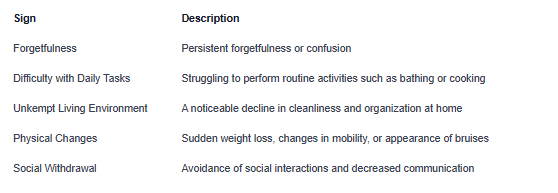Steps to Take When Your Parents Can No Longer Care
March 5, 2025
Navigate caring for aging parents with grace: Discover essential steps when parents need extra support.


Recognizing the Need for Assistance
When it comes to caring for aging parents, it is essential to recognize when additional support is required. This section focuses on identifying the signs that indicate your parents may need help and understanding the limitations of care.

Signs That Your Parents May Need Help
Recognizing the signs that your parents may require assistance is the first step in ensuring their well-being. It's crucial to remain observant and address any changes in their behavior or health promptly. Some common signs that may indicate the need for help include:

By staying vigilant and communicating openly with your parents, you can better understand their needs and provide the support they require.
Acknowledging the Limitations of Care
While your intentions to care for your parents may be sincere, it's crucial to acknowledge the limitations of care that you can feasibly provide. Balancing caregiving responsibilities with personal commitments and work can be challenging, and it's essential to recognize when professional assistance is necessary.
Acknowledging the limitations of care may involve accepting that your parents require specialized support and resources that exceed your capabilities. Seeking help from healthcare providers, social workers, or eldercare services can ensure that your parents receive the comprehensive care they need.
Understanding your own capacity and seeking appropriate assistance demonstrates a commitment to prioritizing the well-being of your parents and ensuring they receive the best possible care. By recognizing these limitations, you can make informed decisions and take the necessary steps to ensure the health and safety of your aging loved ones.
Initiating Conversations
When it becomes apparent that your parents may no longer be able to care for themselves independently, initiating conversations about their evolving needs is a crucial step in ensuring their well-being. This delicate process involves approaching the topic with sensitivity and involving other family members in decision-making.
Approaching the Topic with Sensitivity
Bringing up the topic of shifting care needs with your parents requires a gentle and empathetic approach. It's essential to create a safe and open environment for discussion, allowing them to express their feelings and concerns. Here are some key points to consider when approaching the conversation with sensitivity:
- Choose an appropriate time and place to talk, ensuring privacy and minimal distractions.
- Use compassionate language and convey empathy towards their situation.
- Listen actively to their thoughts and desires, showing respect for their autonomy.
- Acknowledge any potential resistance or emotional reactions with patience and understanding.
Involving Other Family Members
Involving other family members in discussions about transitioning your parents to a care arrangement can provide valuable support and diverse perspectives. Collaborating with siblings, extended family, or close relatives can help distribute responsibilities and ensure comprehensive care for your parents. Here are some steps to consider when involving other family members:

By fostering open communication and involving family members in decision-making, you can create a supportive network to navigate the complexities of transitioning your parents to a care arrangement. Remember that each family member may offer unique perspectives and resources, contributing to a comprehensive and holistic approach to caregiving.
Assessing Care Options

When faced with the responsibility of caring for aging parents who are no longer able to fully care for themselves, it is essential to explore the various care options available. Understanding the differences and benefits of in-home care services, assisted living facilities, and nursing homes can help in making an informed decision regarding your parents' well-being.
In-Home Care Services
In-home care services provide seniors with the assistance they need while allowing them to remain in the comfort of their own homes. These services can range from skilled nursing care to personal care assistance with activities of daily living.

In-home care services offer a personalized and convenient option for seniors who prefer to age in place and maintain a sense of independence.
Assisted Living Facilities
Assisted living facilities are residential communities designed to provide support and assistance to seniors who require help with daily activities but do not need round-the-clock medical care. These facilities offer a balance of independence and support, with services that include personalized care plans, meal preparation, housekeeping, and recreational activities.

Assisted living facilities offer a supportive environment where seniors can maintain their autonomy while receiving the necessary care and services to enhance their quality of life.
Nursing Homes
Nursing homes, also known as skilled nursing facilities, provide around-the-clock medical care and supervision for seniors with complex health needs or disabilities. These facilities are staffed with licensed healthcare professionals, including nurses and physicians, to oversee residents' medical treatment and daily care.

Nursing homes are a suitable option for seniors who require intensive medical care and supervision in a structured and secure environment.
By considering the specific needs and preferences of your aging parents, you can evaluate the pros and cons of each care option to determine the most appropriate setting for their well-being and safety. It is essential to involve your parents in the decision-making process to ensure that their voices and preferences are heard and respected throughout this challenging transition.
Legal and Financial Preparations
When it comes to ensuring the well-being of aging parents who are no longer able to care for themselves, taking legal and financial steps is essential. By addressing legal matters and financial preparations proactively, you can alleviate stress and uncertainty for both your loved ones and yourself. Here are some key aspects to consider:
Power of Attorney
A Power of Attorney (POA) is a legal document that grants a designated individual the authority to make decisions and act on behalf of another person, known as the principal. There are different types of POA, including:

Having a Power of Attorney in place allows you to manage your parent's financial, legal, and healthcare affairs if they are unable to do so themselves. It's crucial to discuss this document with legal professionals to ensure that it aligns with your parent's wishes and state regulations.
Healthcare Directives
Healthcare directives, such as living wills and advance directives, outline a person's preferences for medical treatments and end-of-life care. These directives come into effect if the individual is unable to communicate their wishes. Key components of healthcare directives include:

By having clear healthcare directives in place, you ensure that your parent's healthcare preferences are respected and followed, even when they are unable to express them.
Estate Planning
Estate planning involves making decisions about how a person's assets will be managed and distributed after they pass away. Key components of estate planning include:

Engaging in estate planning allows your parents to have a say in how their assets are distributed, minimizing disputes among family members and ensuring that their wishes are fulfilled. Seeking guidance from legal and financial advisors can help navigate the complexities of estate planning and provide peace of mind for both your parents and yourself.
Emotional Support and Self-Care
Caring for aging parents can be emotionally taxing and physically demanding. It's essential for caregivers to prioritize their emotional well-being and practice self-care to prevent burnout. This section focuses on strategies to manage caregiver stress, seek support from groups, and take care of oneself while navigating the challenges of caring for aging parents.
Managing Caregiver Stress
Providing care for aging parents can lead to high levels of stress and emotional strain. It's important for caregivers to recognize the signs of stress and implement coping mechanisms to manage it effectively. Here are some common signs of caregiver stress:
Signs of Caregiver Stress
Fatigue
Anxiety
Irritability
Feelings of Isolation
Sleep Disturbances
To help manage caregiver stress, caregivers can consider the following strategies:
- Take Regular Breaks: Allow yourself time to rest and recharge.
- Practice Self-Care: Engage in activities that bring you joy and relaxation.
- Seek Emotional Support: Talk to a therapist or counselor to process your emotions.
- Maintain Healthy Habits: Exercise regularly, eat balanced meals, and get enough sleep.
Seeking Support Groups
Connecting with other caregivers through support groups can provide valuable emotional support and practical advice. Caregiver support groups offer a safe space to share experiences, exchange tips, and receive empathy from individuals facing similar challenges. Here are some benefits of joining a support group:
Benefits of Support Groups
Emotional Support
Shared Experiences
Practical Advice
Sense of Community
Reduced Feelings of Isolation
Caregivers can explore both in-person and online support groups tailored to their specific needs and preferences. Joining a support group can help caregivers feel less alone in their caregiving journey and gain valuable insights from others who understand their situation.
Taking Care of Yourself
As a caregiver, it's crucial to prioritize your own well-being to be able to provide the best care for your parents. Neglecting self-care can lead to burnout and negatively impact your physical and mental health. Here are some self-care tips for caregivers:
- Set Boundaries: Learn to say no and establish boundaries to avoid overextending yourself.
- Practice Mindfulness: Engage in relaxation techniques such as meditation or yoga to reduce stress.
- Delegate Tasks: Don't hesitate to ask for help from family members or professional caregivers.
- Stay Connected: Maintain relationships with friends and engage in social activities outside of caregiving.
By practicing self-care, seeking support from others, and managing caregiver stress, caregivers can navigate the challenges of caring for aging parents more effectively and sustainably. Remember, taking care of your own well-being is not selfish; it's essential for being a compassionate and resilient caregiver in the long run.
Implementing and Monitoring Care
As the need for additional care for aging parents arises, it becomes essential to effectively implement and monitor the care arrangements put in place. This involves transitioning to new living arrangements, maintaining regular communication and visits, and being flexible to adapt care plans as needed.
Transitioning to New Living Arrangements
Transitioning to new living arrangements can be a significant change for aging parents and their families. Whether moving to an assisted living facility, a nursing home, or receiving in-home care services, the transition process should be approached with sensitivity and care. Ensuring that the new environment meets the specific needs and preferences of your parents is crucial for a smooth transition.

Regular Communication and Visits
Maintaining regular communication and visits with aging parents under care is vital for their overall well-being and to stay connected. Regular check-ins provide opportunities to monitor their health and happiness, address any concerns promptly, and offer emotional support. Open and honest communication helps build trust and ensures that any changes in their condition or needs are promptly addressed.

Adapting Care Plans as Needed
As the health and needs of aging parents evolve, it is essential to be flexible and adaptable in the care plans that have been put in place. Regular assessments should be conducted to evaluate the effectiveness of the current care arrangements and make necessary adjustments. This may involve modifying the level of care provided, introducing new support services, or reassessing living arrangements to better meet their evolving needs.

By implementing these steps and staying actively involved in the care of aging parents, families can ensure that their loved ones receive the support and attention they need during this important stage of life. Regular monitoring and flexibility in care plans help to maintain the well-being and comfort of aging parents as they navigate through changes in their care requirements.
Sources
https://www.archcare.org/10-steps-to-take-when-your-parents-can-no-longer-care-for-themselves/
https://www.aplaceformom.com/caregiver-resources/articles/cant-be-a-caregiver



























































.jpeg)











































































































































































































.avif)























































.jpeg)
































































.jpeg)














.jpg)









































.jpeg)









































































.avif)




.avif)

















































.avif)







































































































































































